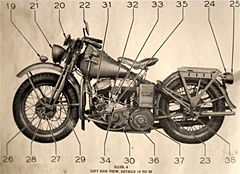
Welcome to Hemlock and Canadice Lakes!
Barns Businesses Cemeteries Churches Clinton & Sullivan Columns Communities Documents Events Time Line Fairs & Festivals Farm & Garden Hiking Homesteads Lake Cottages Lake Scenes Landscapes Library News Articles Old Maps Old Roads & Bridges Organizations People Photo Gallery Podcasts Railroad Reservoir Schools State Forest Veterans Videos
|
“Hemlock Stories” by Ira Briggs |
|
|
C-Bisit By Ira Briggs 1 January 2012 Shortly after my father enlisted in the army in World War II, his superiors were in the process of assigning army vehicles to those individuals who seemed qualified. Prior to joining the service, my father had owned an aged Indian motorcycle in poor condition on the family farm, therefore making him eligible to operate an army motorcycle. The day arrived when all the chosen men were to report to the base motor pool, to take possession of their army-issued vehicles. The place of issue was a steel domed Quonset building, big enough to easily accommodate large planes. Through the extremely large doors at the entrance and exit at each end of the building, one could see hundreds of army vehicles. They were lined up in an orderly fashion along each side, waiting to be distributed to all the qualified men. Among the jeeps and variety of trucks stood a limited number of 1941 army green 45 cubic inch Harley Davidsons. As my Dad approached the motorcycles, he was overwhelmed with pride at the thought that he, a farm boy of eighteen, would soon take charge of a brand new Harley for his use within the army. He had already decided on a suitable name for his new acquisition: “C-Biskit,” the name of a famous racehorse of the time. It was considered vogue among the GIs during this time period to name army motorcycles after racehorses. He longed to stencil its new name on the large, flat, army-green gas tank. Of course, there was only one obstacle between him and the beautiful mechanical marvel that stood before him, that being the consensus of the big brass that he could prove himself capable of its operation. My father waited patiently as he observed the four high ranking officers, clipboards in hand, progressing slowly down the line of individual vehicles. They had the unpleasant and tedious task of observing each man operate his vehicle as he exited and entered the building. When they finally approached my father, he coolly steered the cycle from its position and faced it in the direction of the exit. When he mounted the brand new Harley and started it on the first kick, he found that it was much more responsive than his worn out Indian, and made a critical error. He hadn’t considered that, unlike his old familiar Indian, the Harley accelerator was much more responsive. It also had a temperamental foot clutch (which he later would refer to as a suicide clutch) on the opposite side as the clutch on the Indian. In his mental confusion, my father inadvertently gave her full throttle and simultaneously released the clutch. The Harley lurched forward, leaving a lengthy patch of rubber on the concrete floor. Rigidly gripping the handlebars with all the strength he could muster, Dad caught a glimpse of the horrified faces of the officers as they jumped from the path of his mayhem. The roar of the 45 cubic inches of engine was deafening inside the steel building, as he sped the entire length to its exit. The Harley commanded the attention that Moses had, and Dad’s fellow GI’s looked like the parting of the Red Sea as they hastily cleared the newly created runway, awed by their comrade’s seemingly cocky deviance toward his superiors. My father eventually gained control and felt that he had mastered the operation of his army-issued Harley only after a lengthy drive. He lost all concept of time after his hasty departure from the building and returned nearly half an hour later to the Quonset. As Dad cautiously entered the building, all activity ceased. Every man’s head slowly turned and all eyes were upon Dad as he passed. The four clipboard-clutching officers were still standing in the same position that he had so hurriedly left them in. My father carefully repositioned the Harley into its designated spot and silenced the engine. Before he had a chance to defend his seemingly irrational and arrogant deed, each officer took great satisfaction in verbally reprimanding Dad regarding his total disrespect for government property. After many “Yes Sir” responses on his part, my father began to realize that although the officers very much disapproved of the unorthodox and zealous manner in which he had driven away, they felt that he was more than qualified due to his stunt driver behavior. Making it clear that in the future he was expected to drive only in an orderly and respectful manner, the officers then proceeded on to the next private and his army issued vehicle. All activity resumed and my father began to feel it was better that his defense be left unsaid. Although he found the verbal abuse unsettling, his reward was the unwarranted respect he gained from every G.I. on base.
|
||
|
Editor’s Note: Ira Briggs is a well digger, writer and Arc Living Skills Assistant and a University of Rochester employee who hails from Hemlock. He writes short stories from his memories of the people and events of Hemlock NY.
|
||
